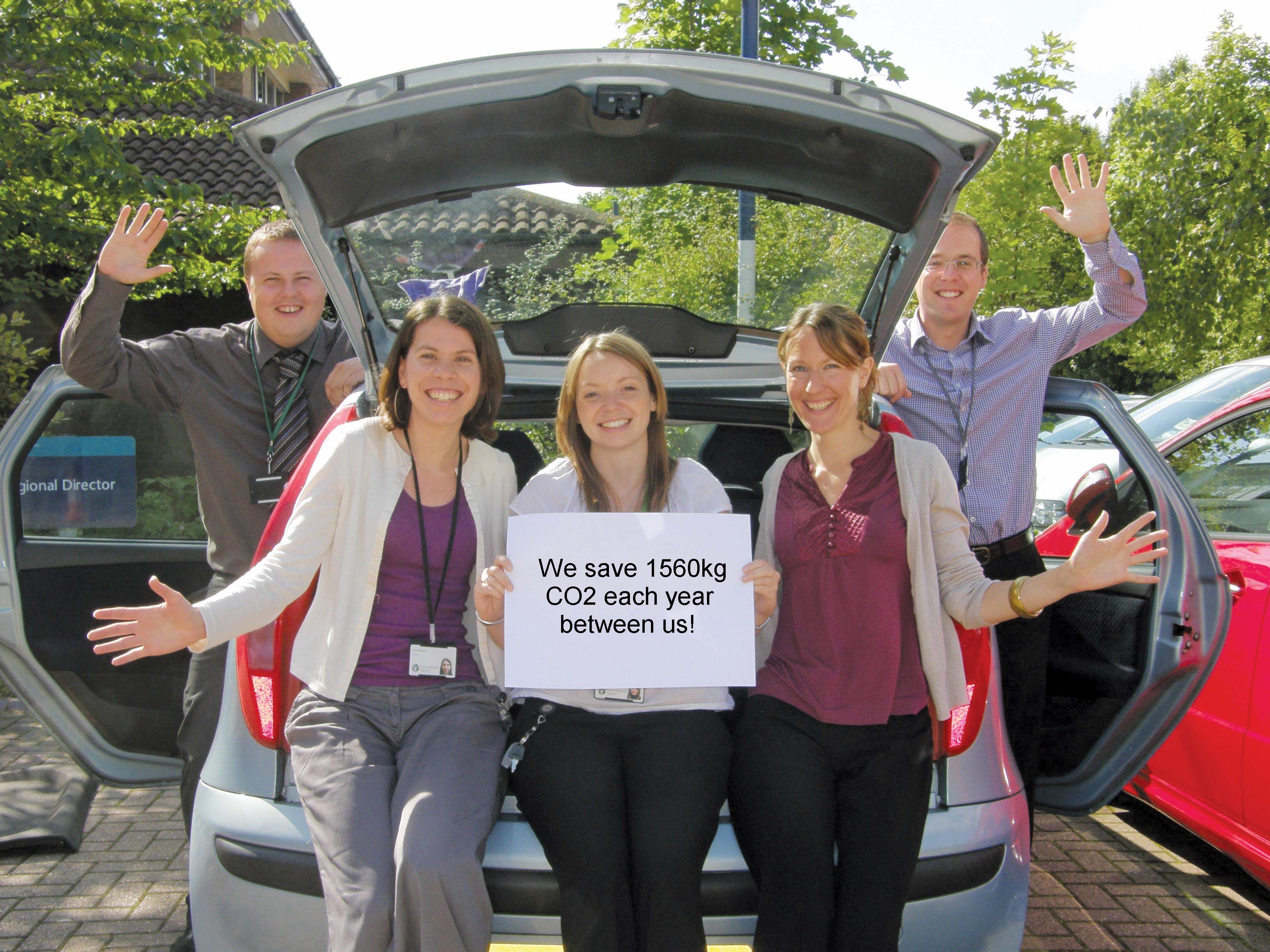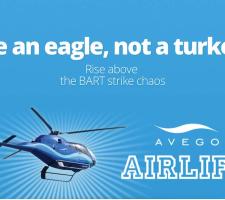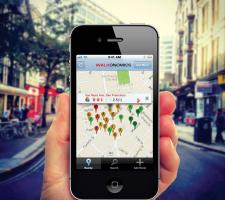
Liftshare members celebrate greener driving
David Crawford highlights responses to transit disruption on both sides of the Atlantic.
Shortly before workers at San Francisco Bay Area Rapid Transit (BART) began a lengthy round of pay and conditions-related strikes in summer 2013, impacting on the daily lives of 400,000 communities, online ridesharing group Avego publicised a new web address: bartstrike.com. By the start of the following week, Avego was encouraging stranded commuters to download its smartphone app by offering them the chance in a raffle of a free helicopter flight.
Subsequently re-launched as7778 Carma, the company – headquartered in the Republic of Ireland – claimed the strike caused a ninefold rise in web traffic and a tripling in sign-UPS for its service.
In Europe and Australia, the term ridesharing tends to apply to web-based services that match drivers with potential passengers or co-drivers that are heading for similar destinations at similar times and want to share costs.
In the US, it tends to mean drivers being paid – sometimes in the form of ‘donations’, for legal reasons - for the use of their vehicles, with the company that organises the ride via its website taking a percentage. This model has brought clashes with taxi drivers and local regulatory authorities over claims of unfair competition, and issues of public safety and the need for licensing; and some court cases are continuing.
But it has proved effective in attracting drivers – creating new income streams for freelances and part-timers - and investors in the local start-UPS that have emerged across the US and garnered over US$100 million in venture funding. For them, public transit strikes are a marketing opening that need cost little to exploit using social media.
At the start of the BART strike another operator - Uber Technologies, headquartered in the city and operating in over 30 more around the world - had 50% more cars on the road than a week earlier. Its system involves potential users downloading an app to an Android or iPhone, or logging into the company’s website to enter their destination and the desired pick-up time and location. They will receive confirmation by email, with the cost being automatically charged to a credit card filed in their account.
When the strike began, another ridesharing organisation called Sidecar recorded a 40% rise in the number of trips it organised. The company encourages its drivers to compete on price for their passengers and says it shows ride accepters the exact cost of their journey before they set off.
Sidecar, and another operator Lyft, also cancelled the commission they normally take on ride transactions to encourage more drivers out onto the roads during the strike.
All ridesharers could take advantage of the Bay Area’s high occupancy vehicle (HOV) freeway lanes, using regional FasTrak Toll tags to gain discounts. Some lanes remained available for longer hours during the strikes.
At the same time, the4802 San Francisco Municipal Transportation Agency (SFMTA) used its website to publicise, among other options, casual pick-up points. Casual ridesharing began in the 1970s in San Francisco (and Washington DC) as a purely informal arrangement between drivers and riders, and now enjoys recognised pick-up points. Drivers are free to ASK for a contribution towards their costs, which are reduced in any case by the HOV lane discounts.
All rideshare companies saw the strike as likely to increase numbers of regular users, once these have tried out their systems.
Some even envisaged the sector eventually becoming a serious rival to public transit; which could mean the SFMTA having to choose between competing and scaling down its services.
In Europe, London tube (metro) unions have been carrying out partially-obeyed strikes over planned ticket office closures in the face of soaring Smart payment at faregates. This trend is being accelerated by the 2014 introduction of contactless bank card acceptance alongside the established Oyster prepayment card.
Transport for London (TfL) intends to move displaced ticket office staff on to roving jobs, where they will use mobile technology to advise passengers, and let disused office space for retail use.
Dismissing union claims that delayed journey refunds can only be dealt with at ticket offices, Institution of Engineering and Technology transport spokesman Jeremy Acklam points out that TfL already offers automatic refunds and that “it’s only a small step to have that technology on a mobile unit”.
In 2012, commuter and software developer Devin Smith set up a private ClaimMyRefund service, which extracts journey history details from smartcard accounts for filling in claims and submits these automatically.
In the longer term, the unions at London Underground object to the planned introduction of driverless trains. These already operate under a €600 million (US$835 million) automation project in Paris – initially on metro line 1 using189 Siemens’ Trainguard MT CBTC solution - and in more than 30 other countries, as well as in one area of London. Paris transit operator RATP is advising TfL on automating four lines.
In addition to official strike information services, help for passengers came from private-sector innovators such as Transport API, an industry platform that uses open data feeds to power operator websites and apps. Its new Transport Buzz product sweeps social media for travellers’ opinions and is searchable by key words including ‘strike’.
During a recent partial tube shutdown, the company opened up a free, basic version of its operator-funded service on affected days. It advised passengers that, by geolocating their tweets, they could help fellow commuters. Once they added transport mode-related hashtags, the system picked their tweets up and mapped in real time.
Founder Jonathan Raper told ITS International: “People could help others decide on whether to opt for a really overcrowded bus, wait for the next one, walk, cycle or take a taxi. We experienced strong interest on strike days.”
Rideshare operator Liftshare, which – European-style - has no paid drivers, offers individual travellers journey matches free of charge, making its income from nearly 1000 corporate clients worldwide. Registered users make contact by email and agree to share driving, or fuel and parking costs.
Says founder managing director Ali Clabburn: “With every disruption to the travel network we see a rise in membership.
What the unions don’t account for is that, for many people, ride-sharing becomes a means of travelling that they prefer as the cost benefits and flexibility are significant.”
Liftshare has recently released a My Personal Travel Plan (myPTP) service, aimed at helping human resources departments to plan multimodal travel for employees.
In another boost for competing modes, TfL’s growing network of cycle superhighways aims to generate an additional 150,000 bike trips a day. Supporting measures include bus stop bypasses; schemes for making 33 roundabouts and gyratories safer; and using spare land alongside railway lines.
Great for business
Members of the Chicago, US-based Global Corporate Executive Programme (CEP) have produced a hit list of reasons why transit strikes can be ‘great for business’ in both the long- and short-terms. These include:
• Companies having to decide which face-to-face meetings are absolutely necessary, as opposed to phoning, emailing or video-conferencing, so reducing transport use;
• Staff finding how walkable their journeys are, at least in part, using GPS-enabled smartphone apps to navigate, and becoming healthier and readier for work in the process; and
• Opportunities to test financial risk and business contingency response plans, as well as staff levels of internet and mobile connectivity, in advance of – and free from the immediate pressures of – weather- or transport-induced transport paralysis.
The second point chimes in well with pedestrian-friendly rating systems developed by innovators on both sides of the Atlantic, such as Walk Score and7779 Walkonomics. The First uses Google’s local search application programming interface to rank commuter-friendly location criteria, initially for the real estate sector. It operates in the US, Australia, Canada and UK.
Walkonomics rates streets - in cities including San Francisco, Toronto and London – in qualitative terms, for example traffic levels, safety, ease of crossing, gradient and pleasantness. Founder Adam Davies expects to offer joined-up friendly-street navigation capability within two to three years.
The CEP is a group of C-level (as in chief executive/financial officer) decision-makers operating under the auspices of the Forum of Incident Response and Security Teams, a worldwide organisation promoting collaboration and shared knowledge against security threats.
Shortly before workers at San Francisco Bay Area Rapid Transit (BART) began a lengthy round of pay and conditions-related strikes in summer 2013, impacting on the daily lives of 400,000 communities, online ridesharing group Avego publicised a new web address: bartstrike.com. By the start of the following week, Avego was encouraging stranded commuters to download its smartphone app by offering them the chance in a raffle of a free helicopter flight.
Subsequently re-launched as
In Europe and Australia, the term ridesharing tends to apply to web-based services that match drivers with potential passengers or co-drivers that are heading for similar destinations at similar times and want to share costs.
In the US, it tends to mean drivers being paid – sometimes in the form of ‘donations’, for legal reasons - for the use of their vehicles, with the company that organises the ride via its website taking a percentage. This model has brought clashes with taxi drivers and local regulatory authorities over claims of unfair competition, and issues of public safety and the need for licensing; and some court cases are continuing.
But it has proved effective in attracting drivers – creating new income streams for freelances and part-timers - and investors in the local start-UPS that have emerged across the US and garnered over US$100 million in venture funding. For them, public transit strikes are a marketing opening that need cost little to exploit using social media.
At the start of the BART strike another operator - Uber Technologies, headquartered in the city and operating in over 30 more around the world - had 50% more cars on the road than a week earlier. Its system involves potential users downloading an app to an Android or iPhone, or logging into the company’s website to enter their destination and the desired pick-up time and location. They will receive confirmation by email, with the cost being automatically charged to a credit card filed in their account.
When the strike began, another ridesharing organisation called Sidecar recorded a 40% rise in the number of trips it organised. The company encourages its drivers to compete on price for their passengers and says it shows ride accepters the exact cost of their journey before they set off.
Sidecar, and another operator Lyft, also cancelled the commission they normally take on ride transactions to encourage more drivers out onto the roads during the strike.
All ridesharers could take advantage of the Bay Area’s high occupancy vehicle (HOV) freeway lanes, using regional FasTrak Toll tags to gain discounts. Some lanes remained available for longer hours during the strikes.
At the same time, the
All rideshare companies saw the strike as likely to increase numbers of regular users, once these have tried out their systems.
Some even envisaged the sector eventually becoming a serious rival to public transit; which could mean the SFMTA having to choose between competing and scaling down its services.
In Europe, London tube (metro) unions have been carrying out partially-obeyed strikes over planned ticket office closures in the face of soaring Smart payment at faregates. This trend is being accelerated by the 2014 introduction of contactless bank card acceptance alongside the established Oyster prepayment card.
Transport for London (TfL) intends to move displaced ticket office staff on to roving jobs, where they will use mobile technology to advise passengers, and let disused office space for retail use.
Dismissing union claims that delayed journey refunds can only be dealt with at ticket offices, Institution of Engineering and Technology transport spokesman Jeremy Acklam points out that TfL already offers automatic refunds and that “it’s only a small step to have that technology on a mobile unit”.
In 2012, commuter and software developer Devin Smith set up a private ClaimMyRefund service, which extracts journey history details from smartcard accounts for filling in claims and submits these automatically.
In the longer term, the unions at London Underground object to the planned introduction of driverless trains. These already operate under a €600 million (US$835 million) automation project in Paris – initially on metro line 1 using
In addition to official strike information services, help for passengers came from private-sector innovators such as Transport API, an industry platform that uses open data feeds to power operator websites and apps. Its new Transport Buzz product sweeps social media for travellers’ opinions and is searchable by key words including ‘strike’.
During a recent partial tube shutdown, the company opened up a free, basic version of its operator-funded service on affected days. It advised passengers that, by geolocating their tweets, they could help fellow commuters. Once they added transport mode-related hashtags, the system picked their tweets up and mapped in real time.
Founder Jonathan Raper told ITS International: “People could help others decide on whether to opt for a really overcrowded bus, wait for the next one, walk, cycle or take a taxi. We experienced strong interest on strike days.”
Rideshare operator Liftshare, which – European-style - has no paid drivers, offers individual travellers journey matches free of charge, making its income from nearly 1000 corporate clients worldwide. Registered users make contact by email and agree to share driving, or fuel and parking costs.
Says founder managing director Ali Clabburn: “With every disruption to the travel network we see a rise in membership.
What the unions don’t account for is that, for many people, ride-sharing becomes a means of travelling that they prefer as the cost benefits and flexibility are significant.”
Liftshare has recently released a My Personal Travel Plan (myPTP) service, aimed at helping human resources departments to plan multimodal travel for employees.
In another boost for competing modes, TfL’s growing network of cycle superhighways aims to generate an additional 150,000 bike trips a day. Supporting measures include bus stop bypasses; schemes for making 33 roundabouts and gyratories safer; and using spare land alongside railway lines.
Great for business
Members of the Chicago, US-based Global Corporate Executive Programme (CEP) have produced a hit list of reasons why transit strikes can be ‘great for business’ in both the long- and short-terms. These include:
• Companies having to decide which face-to-face meetings are absolutely necessary, as opposed to phoning, emailing or video-conferencing, so reducing transport use;
• Staff finding how walkable their journeys are, at least in part, using GPS-enabled smartphone apps to navigate, and becoming healthier and readier for work in the process; and
• Opportunities to test financial risk and business contingency response plans, as well as staff levels of internet and mobile connectivity, in advance of – and free from the immediate pressures of – weather- or transport-induced transport paralysis.
The second point chimes in well with pedestrian-friendly rating systems developed by innovators on both sides of the Atlantic, such as Walk Score and
Walkonomics rates streets - in cities including San Francisco, Toronto and London – in qualitative terms, for example traffic levels, safety, ease of crossing, gradient and pleasantness. Founder Adam Davies expects to offer joined-up friendly-street navigation capability within two to three years.
The CEP is a group of C-level (as in chief executive/financial officer) decision-makers operating under the auspices of the Forum of Incident Response and Security Teams, a worldwide organisation promoting collaboration and shared knowledge against security threats.








